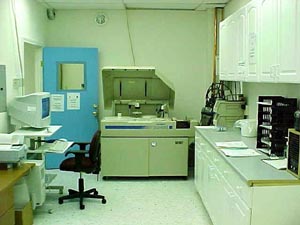A US Department of Education research report released Wednesday suggests that mandatory random drug testing of high school students has a small positive impact in reducing past-month drug use, but has little effect on teens' intentions to use drugs in the future. Nor, the study found, is there any indication that drug testing of athletes and students involved in extracurricular activities has any spillover effect on students not involved in such programs.

Under a pair of US Supreme Court decisions, school districts were given the okay first to subject student athletes to mandatory random drug tests and later to expand the testable population to include students who engaged in extracurricular activities. Under a federal grant program in place since 2003, the number of school districts subjecting students to the privacy-invading drug tests has increased from about 5% at the beginning of the decade to 14% now.
But the Department of Education study suggests student drug testing has little lasting positive impact. The brightest news for drug testing advocates is that among students in extracurricular activities in schools with such programs, only 16.5% reported past month drug use, compared to 21.9% in schools without drug testing regimes. Also, drug testing programs did not appear to inhibit students from participating in extracurricular activities.
While the presence of drug testing slightly reduced self-reported drug use among students engaged in extracurricular activities, the study found no impact on students not involved in extracurricular activities. In both drug testing and non-drug testing schools, 36% of those students reported using a drug within the past month.
Nor did the presence of drug testing programs have any impact on teens' plans to use drugs in the future. According to the study, 34% of students covered by drug testing reported they "probably will" or "definitely will" use drugs in the next year, compared to 33% of comparable students in schools without drug testing.
The obvious conclusion seems to be that if schools want an effective means of reducing student drug use, mandatory random drug testing isn't it -- it's achieved only modest and temporary reductions in teen drug use, and limited to those achieving teens who least need the help.
This work by StoptheDrugWar.org is licensed under Creative Commons Attribution-ShareAlike 4.0 International
Comments
Hmmm...
So what's a piss test cost, 30 Bucks? Somebody's making money in hard times.
In reply to Hmmm... by Auntie Social (not verified)
Yes Anon
That's right. "Somebody's a busy body and making money in the hard times created by the wars on drugs."
Thank you Dept. of Education
Testing students in schools is a fear tactic. Fear is never a good motivator. The benefits do not out-weigh the negative impact on young people. It is simply a matter of invasion of privacy by the administration of the institution.
As a mother of two children, I stand against any kind of urine analysis and will go to the school and say so.
I think it is worse for the
I think it is worse for the students than good because the people who will use drugs and not want to get caught but want to do an extra curricular activity may decide to not do it and will give that student more time to do drugs and lay around rather than doing it ocasionaly because they have a sport. I know alot of pll who used to play sports and occasionaly smoke some chronic. Now that they got to high school where there is the testing they decided to quit because they wernt going to stop smoking. Now because they have all that extra time on there hand they smoke more weed than they ever would have. The drug tests just make it worse.
Add new comment